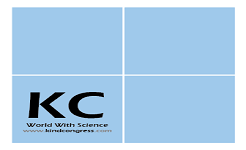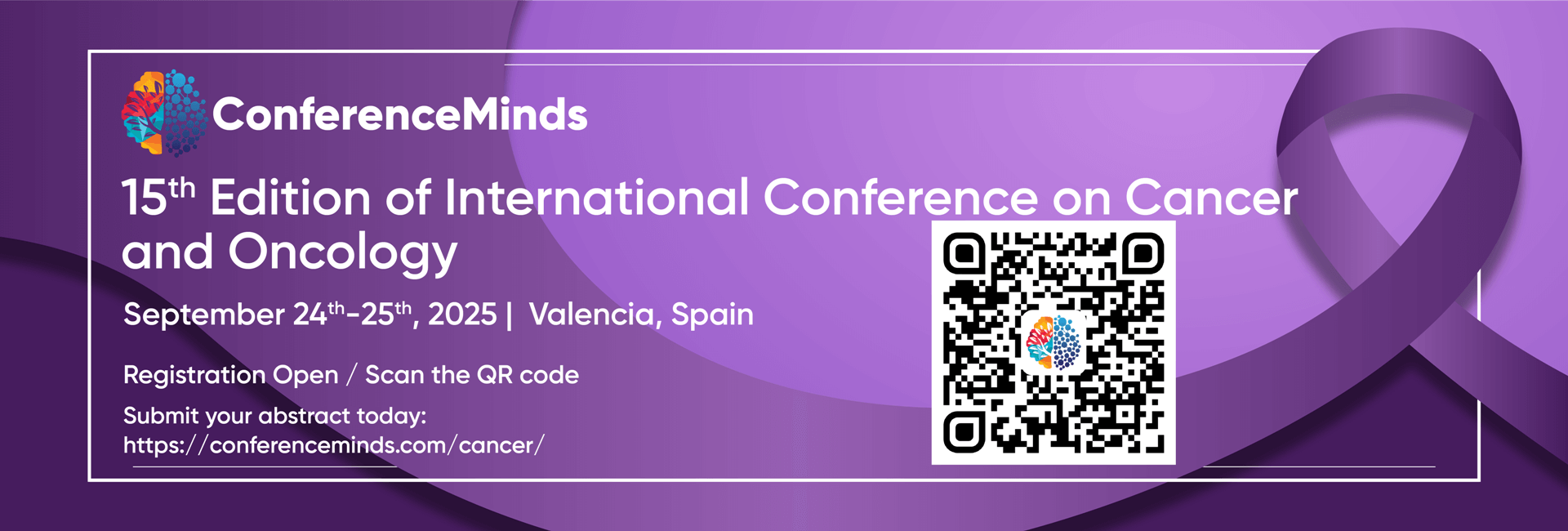Event Date
September 24-25, 2025
Venue
Valencia, Spain
– Previous Conference Performers / Professionals From Around The Globe –
Media Partners/Collaborator
A huge thanks to all our amazing partners. We couldn’t have a conference without you!










Sponsors/Exhibitors
A huge thanks to all our amazing partners. We couldn’t have a conference without you!


Cancer Conference 2025
The 15th Edition of the International Conference on Cancer and Oncology will take place on September 24-25, 2025, in Valencia, Spain—a city known for its blend of historical charm and cutting-edge medical research. This prestigious event will bring together experts, researchers, clinicians, and professionals from across the globe to share the latest advancements in cancer research, treatment modalities, and oncology care.
As the world faces an ever-growing cancer burden, this conference aims to address critical challenges and highlight innovative solutions. Through a comprehensive program of keynote speeches, scientific presentations, interactive sessions, and networking opportunities, attendees will gain invaluable insights into the ongoing fight against cancer and explore the future of oncology.
Conference Objectives:
-
Facilitate Knowledge Sharing:
The conference will showcase the latest breakthroughs in cancer research and treatment. Leading researchers and clinicians will present their findings on novel therapies, precision medicine, immunotherapy, and advancements in early detection and diagnosis. -
Promote Collaboration Across Disciplines:
One of the primary goals is to encourage cross-disciplinary collaboration between oncologists, researchers, pharmaceutical companies, and healthcare providers. This collaborative approach is vital in developing innovative treatments and improving patient outcomes. -
Provide a Platform for Emerging Research and Technologies:
The conference will provide an opportunity for early-career researchers, medical professionals, and innovators to present their work, highlighting emerging technologies such as artificial intelligence in oncology, liquid biopsy techniques, and the latest advancements in radiation therapy. -
Address Global Cancer Health Challenges:
With cancer rates rising globally, the conference will explore the challenges of treating cancer in low-resource settings, disparities in cancer care, and how global health policies can be adapted to provide better cancer treatment and prevention worldwide. -
Enhance Professional Development:
The conference will include educational sessions, masterclasses, and workshops designed to improve clinical practices and research methodologies. Participants will gain the tools and knowledge they need to stay at the forefront of cancer care.
Conference Benefits:
-
Exposure to Cutting-Edge Cancer Research and Innovations:
Attendees will have access to the latest findings in cancer treatment, including novel drug therapies, immunotherapy, targeted treatments, and advancements in personalized medicine. Keynote speakers and session leaders will provide insights into the most promising cancer breakthroughs. -
Networking Opportunities:
The conference will offer extensive networking opportunities with leaders in the oncology field. Participants will meet with fellow researchers, clinicians, and healthcare professionals from across the world, facilitating collaborations and future partnerships that can drive cancer care forward. -
Workshops and Skill-Building Sessions:
Interactive workshops and educational sessions will provide hands-on learning experiences, including topics like precision oncology, the use of biomarkers in treatment planning, and emerging technologies in cancer diagnostics and therapy. -
Global Perspective on Cancer Care:
With a diverse international audience, the conference will provide a broad perspective on how cancer is treated and researched across different regions. Participants will gain a better understanding of how to address global disparities in cancer care, access to treatment, and prevention strategies. -
Exposure to New Products and Technologies:
The conference will feature an exhibition area where leading companies in the cancer treatment and research sectors will showcase the latest products, therapies, and technologies. Attendees can explore the cutting-edge tools that are transforming the way cancer is diagnosed, treated, and managed. -
Awards and Recognition:
The event will highlight the work of exceptional professionals in oncology, recognizing those who have made groundbreaking contributions to the field of cancer research, treatment, and patient care. Special awards will be presented to honor excellence in oncology. -
Cultural Experience in Valencia:
In addition to the professional benefits, attendees will have the opportunity to explore the vibrant city of Valencia. Known for its rich history, beautiful architecture, and Mediterranean cuisine, Valencia offers a perfect blend of work and leisure for conference participants.
Why Attend?
- Cutting-Edge Research: Gain insights into the latest research findings, clinical trials, and technological advancements in the field of oncology.
- Networking Opportunities: Connect with experts, researchers, and industry leaders from around the world, facilitating potential collaborations and partnerships.
- Expert Speakers: Hear from renowned keynote speakers and panelists who will share their expertise and experiences in various oncology subfields.
- Interactive Workshops: Participate in hands-on workshops that offer practical training and skills development in the latest cancer treatment techniques.
- Global Perspectives: Engage with professionals from diverse backgrounds and regions, sharing best practices and innovative solutions to common challenges in cancer care.
Who Will Attend?
The conference will attract a wide range of attendees, including:
- Oncologists: Medical doctors specializing in the diagnosis and treatment of cancer.
- Researchers: Academics and clinical researchers dedicated to advancing knowledge in cancer biology and therapeutics.
- Healthcare Professionals: Nurses, pharmacists, and allied health professionals involved in cancer care and support.
- Industry Representatives: Professionals from pharmaceutical and biotechnology companies showcasing the latest products and technologies.
- Medical Students and Residents: Emerging professionals eager to learn about the latest trends and developments in oncology.
Sessions and Tracks
1. Keynote Addresses
Description: Esteemed leaders in oncology will present keynote speeches that provide insights into the future of cancer research and treatment, highlighting groundbreaking discoveries and innovations.
2. Advances in Cancer Immunotherapy
Description: This track will focus on the latest developments in immunotherapy, including CAR T-cell therapy, checkpoint inhibitors, and their applications in various cancer types.
3. Precision Medicine in Oncology
Description: Explore the role of precision medicine in cancer treatment, discussing biomarker identification, genomic profiling, and personalized treatment strategies tailored to individual patients.
4. Clinical Trials and Research Innovations
Description: Engage with researchers presenting the latest findings from ongoing clinical trials, discussing challenges, successes, and the implications of new data for future treatment protocols.
5. Tumor Biology and Microenvironment
Description: Delve into the complex interactions between tumor cells and their microenvironment. This track will cover topics such as tumor evolution, metastasis, and the role of the immune system.
6. Cancer Screening and Early Detection
Description: Discuss advancements in cancer screening technologies and strategies for early detection, including liquid biopsies, imaging techniques, and population health initiatives.
7. Palliative Care and Quality of Life
Description: Focus on the importance of palliative care in oncology, addressing symptom management, psychosocial support, and improving quality of life for patients and their families.
8. Surgical Innovations in Oncology
Description: Explore the latest surgical techniques and technologies in cancer treatment, including minimally invasive approaches, robotic surgery, and advancements in surgical oncology.
9. Radiotherapy Advances
Description: Examine the latest developments in radiation therapy, including targeted therapies, stereotactic body radiotherapy (SBRT), and the integration of radiotherapy with other modalities.
10. Nutrition and Cancer Care
Description: Discuss the role of nutrition in cancer prevention and treatment, focusing on dietary interventions, supplementation, and the impact of nutrition on patient outcomes.
11. Global Cancer Initiatives
Description: Engage in discussions on global efforts to combat cancer, including strategies for improving access to care, health disparities, and international collaborations in research.
12. Psychosocial Aspects of Cancer
Description: Explore the psychological impact of cancer on patients and families, discussing strategies for mental health support, coping mechanisms, and communication in care.
13. Cancer Genomics and Molecular Profiling
Description: Focus on the latest advancements in cancer genomics, including next-generation sequencing, molecular profiling, and their implications for targeted therapies.
14. Treatment Strategies for Rare Cancers
Description: Address the unique challenges in diagnosing and treating rare cancers, discussing clinical trials, research initiatives, and emerging therapies.
15. Future Directions in Oncology
Description: Conclude the conference with discussions on the future of oncology, exploring trends, challenges, and opportunities in cancer research and treatment.
Market Analysis
Current Trends in Oncology
The global oncology market is witnessing significant growth driven by advancements in technology, an increase in cancer prevalence, and rising demand for effective treatment options.
- Technological Innovations: The integration of artificial intelligence, telemedicine, and advanced diagnostic tools is transforming the landscape of oncology, improving patient outcomes and streamlining care processes.
- Rising Incidence of Cancer: The increasing prevalence of cancer due to aging populations, lifestyle factors, and environmental influences is driving demand for cancer treatment and research.
- Personalized Medicine: There is a growing emphasis on personalized treatment approaches, including the use of genomic profiling and targeted therapies tailored to individual patients.
Market Size and Growth
The global oncology market is projected to grow significantly over the coming years. This growth is fueled by the increasing incidence of cancer, advancements in surgical and therapeutic options, and rising awareness of cancer prevention and early detection.
Competitive Landscape
The oncology market is characterized by a competitive landscape with numerous pharmaceutical companies, biotech firms, and research institutions focused on developing innovative treatments and solutions.
About the Venue
City: Valencia, Spain
Overview: Valencia is a stunning coastal city located on Spain’s eastern Mediterranean coast. Known for its combination of rich history, futuristic architecture, and beautiful beaches, Valencia offers a perfect blend of tradition and innovation. It’s the third-largest city in Spain, yet it maintains a laid-back, relaxed vibe, especially compared to other major Spanish cities like Madrid and Barcelona. Valencia is famous for its incredible gastronomy (home of the famous paella), a thriving arts and culture scene, and a welcoming atmosphere.
History: Valencia has a long and varied history, dating back over 2,000 years. Originally founded by the Romans in 138 BC as Valentia Edetanorum, the city has seen many different cultures come and go, including the Moors, who left a lasting impact on the city’s architecture and culture. In the Middle Ages, Valencia became an important trading hub, and in the modern era, it’s become one of Spain’s most dynamic cities.
Top Tourist Attractions in Valencia:
- City of Arts and Sciences (Ciudad de las Artes y las Ciencias)
- One of the most iconic attractions in Valencia, the City of Arts and Sciences is a futuristic complex designed by architect Santiago Calatrava. It includes the Oceanografic, Europe’s largest aquarium; the Hemisférico, an IMAX cinema and planetarium; the Museo de las Ciencias, a science museum; and the striking Palau de la Música, a concert hall. It’s a must-see for anyone interested in modern architecture and science.
- La Lonja de la Seda (Silk Exchange)
- This UNESCO World Heritage site is one of the best-preserved examples of Gothic architecture in Europe. Built in the 15th century, it was once the center of Valencia’s prosperous silk trade. The ornate building and its beautiful courtyard make it a fascinating place to explore, with its rich history and incredible detail.
- Valencia Cathedral and El Miguelete Bell Tower
- The stunning Valencia Cathedral is located in the heart of the old town. Inside, you can admire artworks and relics, including the Holy Grail (according to some claims). The El Miguelete bell tower offers panoramic views of the city, and visitors can climb its 207 steps for an unforgettable experience.
- La Albufera Natural Park
- Just outside Valencia, La Albufera is a vast freshwater lagoon surrounded by rice fields and wetlands, making it a haven for birdwatchers and nature lovers. You can take a boat tour on the lagoon or enjoy a meal of paella, the dish for which Valencia is most famous, in the nearby village of El Palmar.
- Turia Gardens (Jardín del Turia)
- The Turia Gardens is one of the largest urban parks in Spain. Once the course of the Turia River, the riverbed was transformed into a park after a devastating flood in 1957. It stretches for several kilometers through the city, offering walking and cycling paths, playgrounds, gardens, and sports facilities. The park is home to many cultural attractions, including the Gulliver Park, a giant playground based on the story of Gulliver’s Travels.
- Mercado Central (Central Market)
- One of the largest and oldest food markets in Europe, the Mercado Central is a vibrant hub of local life. Located in a beautiful modernist building, the market offers an array of fresh local produce, meats, cheeses, fish, and spices. It’s a great spot to experience local flavors and enjoy tapas or a traditional Spanish meal.
- Plaza de la Virgen and Plaza de la Reina
- These two central squares in the historic heart of Valencia are perfect for strolling. Plaza de la Virgen is home to the Basilica de la Virgen de los Desamparados and the Turia Fountain, while Plaza de la Reina is famous for its grand cafés and shops, offering a picturesque setting in which to relax and soak in the atmosphere of the city.
- The Oceanographic
- Located in the City of Arts and Sciences, the Oceanographic is Europe’s largest aquarium and one of the most important marine research centers in the world. It features impressive exhibits on marine ecosystems, including an underwater tunnel, shark tanks, dolphin shows, and the chance to learn about ocean conservation.
- Museo de Bellas Artes (Museum of Fine Arts)
- This museum is home to an outstanding collection of artwork spanning from the Middle Ages to modern times. It features masterpieces by artists such as Goya, El Greco, Velázquez, and Sorolla, along with a rich collection of Spanish paintings, sculptures, and decorative arts.
- Bioparc Valencia
- For animal lovers, Bioparc Valencia is an innovative, immersive zoo that recreates the natural habitats of its animals. Unlike traditional zoos, Bioparc uses natural barriers instead of cages, allowing visitors to feel like they are stepping into the African savanna, Madagascar, or the jungle. The park houses species like lions, giraffes, gorillas, and elephants.
- The Beaches of Valencia
- Valencia boasts several beautiful beaches just a short distance from the city center. Malvarrosa Beach and El Saler Beach are the most popular, with fine golden sand and clear waters. The beach promenade is lined with restaurants serving fresh seafood and paella, making it a great spot to relax and enjoy the Mediterranean lifestyle.
- Barrio del Carmen
- The Carmen neighborhood is the bohemian heart of Valencia, full of narrow winding streets, historic buildings, and vibrant street art. This area is home to trendy bars, local restaurants, and independent shops, and is perfect for wandering and soaking in the local culture.
- Torres de Serranos (Serranos Towers)
- Originally part of the old city walls, the Serranos Towers are one of the most impressive examples of medieval architecture in Valencia. The towers once served as the main entrance to the city, and visitors can climb to the top for panoramic views over the city.
- Palacio del Marqués de Dos Aguas
- This baroque palace is now home to the National Museum of Ceramics and Decorative Arts. The building itself is a stunning example of Spanish baroque architecture, with an ornate façade and a beautifully decorated interior. Inside, visitors can admire impressive ceramics, furniture, and tapestries from Spain’s royal history.
- Cabañal-Cañamelar
- The Cabañal district is a traditional working-class neighborhood by the sea, known for its colorful fisherman’s houses, local markets, and vibrant atmosphere. The neighborhood has a rich cultural heritage and is a great place to experience authentic Valencian life, away from the more touristy areas of the city.










































